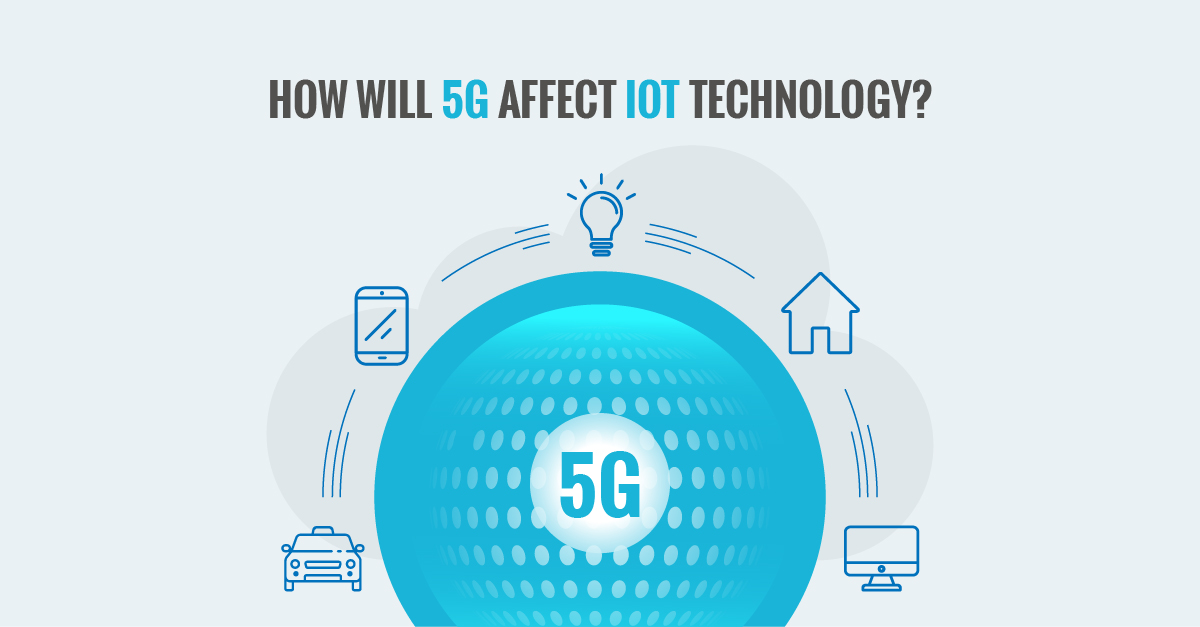
How will 5G affect IoT Technology?
Posted On: February 26, 2020
Transformations happen in the blink of an eye. Inventions come and go. What was new yesterday may be outdated today. The world has grown from 2G to 4G at an unprecedented speed, giving way to 5G today. The fifth-generation wireless network technology has the potential to change IoT technology.
The combination of 5G and IoT will bring more efficiency regardless of sectors. Gartner anticipates that two-thirds of enterprises plan to deploy 5G by 2020. Therefore the combination will surely be pivotal for the paradigm shift. The Internet of things enabled with 5G speed will bring advantages to consumers and companies both.
MarketsandMarkets forecasts the global 5G IoT market size to grow from USD 0.7 billion in 2020 to USD 6.3 billion by 2025, at a Compound Annual Growth Rate (CAGR) of 55.4% during the forecast period.
The number of connected devices is expected to reach around 22 to 25 billion by 2025 ranging from consumer wearable devices and industrial devices to connected cars. The diverse set of connected devices from a range of industry verticals needs a unique communication infrastructure. In addition, these connected devices require low power, faster connectivity, and higher security.
Let’s explore how 5G can become a catalyst for next-gen IoT services
Speed:
5G will be ten times faster in comparison to current LTE networks. The commercial success of IoT depends on its performance. 5G data transfer will increase its speed. It will allow communicating faster than ever with other IoT devices, smartphones and tablets, software in the form of its app or website, and more.
Connectivity:
A steady and constant network will bring more productivity to the IoT system. 5G networks will be more reliable to establish more stable connections as it enables massive IoT deployments. The only reason is it reduces latency to near real-time and network capacity can support more connections. Connected devices will get real-time updates especially electronic locks, security cameras, and other monitoring systems. An IoT ecosystem equipped with 5G internet service will break the stereotype. It will boost the infrastructure and bridge the gap between rural and urban.
Agriculture:
AI-powered IoT mechanisms will improve agricultural management. The environmental sensors and data will help farmers to predict what’s coming their way. 5G connected farming equipment will maximize the crop yields with minimum use of water, pesticides, and fertilizers.
Healthcare:
Healthcare will be more beneficial with 5G network connectivity. Health wearables will be more effective in helping to alarm health issues at-risk. It will improve the quality of telemedicine services. Similarly, live transmission of high-definition surgery videos can be remotely monitored. 5G will bring meaningful functionality to patients and their doctors.
Automotive:
Similarly, 5G will highly boost the automotive industry. For instance, the concept of driverless cars or connected cars. This works by augmented reality (AR) and virtual reality (VR) technology. Certainly, it will enhance network-facilitated communication for autonomous driving and improve the vehicular communications services as well. As a result, there will be benefits such as vehicle convenience and safety, avoid accidents, coordinated driving, and real-time local updates.
Communications:
The communication providers will put up wireless broadband instead of fiber networks. Therefore, it will significantly reduce costs. AR and VR technology will change the customer experience in gaming, e-commerce, and other customer-centric applications. Consumer experience will be revolutionized as low latency and high data rates will be achieved.
Security:
5G will transform the old school security systems. 24×7 live monitoring can be done without any buffering. It will gear up the constant data transfer. As a result, it will tighten up the security. It will be very useful to Government Administration and security agencies.
Smart Cities:
Likewise, Smart City projects will be accelerated. For example, sensors and big data will provide more efficient traffic management. The waste management system will become more transparent. When a certain threshold is reached, the waste container receives a level sensor. So the management platform of a truck driver receives a notification on the smartphone. It avoids half-empty drains. The wireless technology will help cars to communicate with one another and civic infrastructure.
5G powered IoT
The future of the combination of 5G and IoT is unlimited irrespective of the sector. It empowers and provides solutions in all sectors including manufacturing, agriculture, fashion, restaurant, healthcare, education, etc. Therefore 5G is set to bring IoT closer to the mass and as well as business. With the ability to handle massive data volumes with high transaction rate from remote locations, 5G will unlock its true potential. As 5G enabled networks go online, one can say that the future of equal opportunities has arrived. In conclusion, regardless of the industry small and big enterprises will start from the same line.



